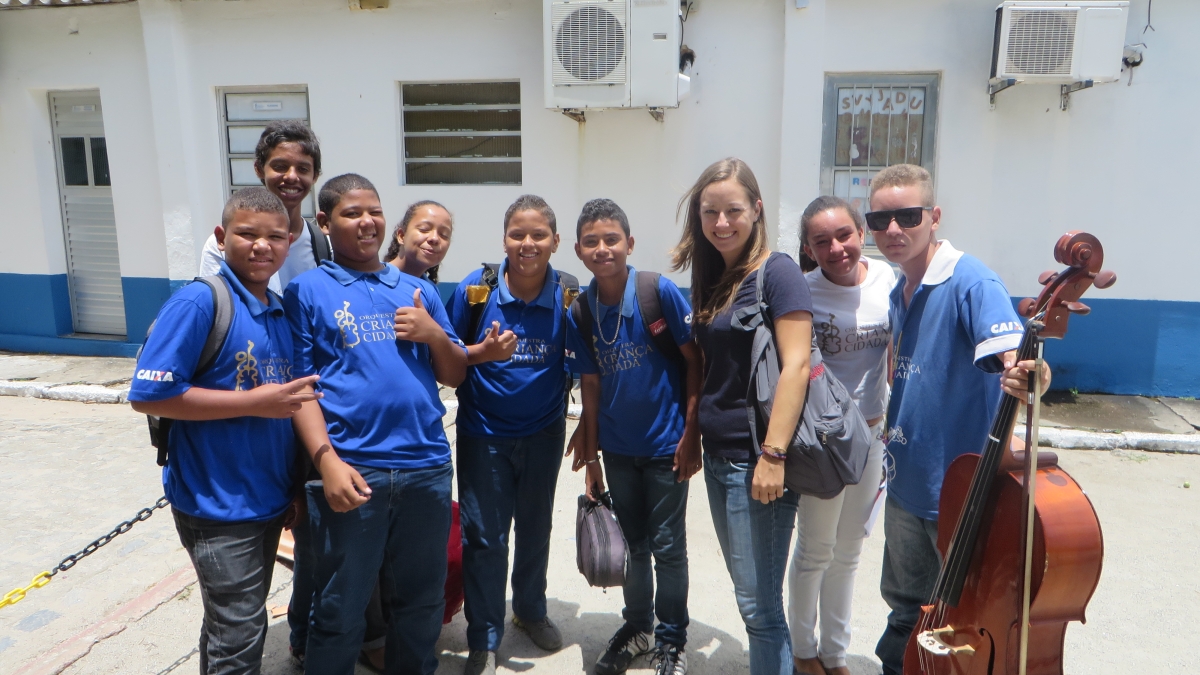ASU alum enacts positive change in communities through music

When Arizona State University School of Music alumna Amy Swietlik decided to apply for a Fulbright U.S. Student Program grant to study social projects and music education in Brazil, she didn’t know exactly where it would lead.
Armed with a bachelor of music in music education degree and a master of arts in music (ethnomusicology), she set off for Brazil’s fourth-largest city, Recife, to learn more about the connection between music and community.
“I received a lot of wonderful support here at ASU, both in my undergraduate and master's degrees, to pursue this type of research, this type of work, looking more at informal music education in a community sense,” says Swietlik.
While in Recife, Swietlik spent time researching three different community music education programs. One was a more traditional program that took place on an army base and used music theory, singing and recorders. The other two met in public spaces in low income areas and were centered on break dancing, capoeira and hip-hop.
“The main result that I found with the research with these three organizations was that the music community, and especially informal music education, can do wonders for improving children’s self esteem and for helping them build identity and character,” said Swietlik. “All of the organizations did this through different means but they had similar results: The children were becoming more proud and functioning citizens within society. They were kids that could dream, kids that could see a future.”
Despite difficult circumstances, the children were really able to flourish with the help of music, she explains.
“Music ... provides an avenue for self-expression and emotional release, which these kids don’t often get in their everyday lives,” says Swietlik. “Through music they learn to work with other kids, they learn cooperation, they learn to dream, they learn to be competent on their instruments, they learn how to play whatever it is that makes them happy. And then they get to get up and perform in front of people, and the amount of confidence and pride that you see in these children when they get up in front of an audience is so profound.”
“Amy’s story is an excellent example of how the School of Music fosters social embeddedness, one of the pillars of the ASU charter, by engaging with communities through music,” Heather Landes, director of the school said. “People are interacting with music in many new and interesting ways, and the ASU School of Music is committed to preparing our students for this reality so that they become creative leaders who transform society through music.”
Now back in the states, Swietlik plans to write articles and give presentations on her research, but this ambitious music grad is also taking her experience one step further.
Swietlik is in the process of founding the Harmony Project Phoenix*, along with fellow ASU School of Music graduate Diogo Pereira. The program is designed to help bring music education to underfunded communities in south Phoenix. In partnership with the Tanner Community Development Corporation, the Harmony Project Phoenix will offer students music instruction four days a week, for two hours a day.
It’s a way for Swietlik to explore the real-life application of her research, and also a way for her to make a lasting impact on a community right here in Arizona.
“Having these organizations that exist over a long period of time is really key,” says Swietlik. “You can’t go into these communities for one or two classes and expect to make a change; you really have to develop strong ties within the community, within the family, within the public schools and with the kids. You have to be there for them for many, many years to help them to develop and to grow.”
*At press time the Harmony Project Phoenix was originally called the Community Music Program. It has since been re-named.